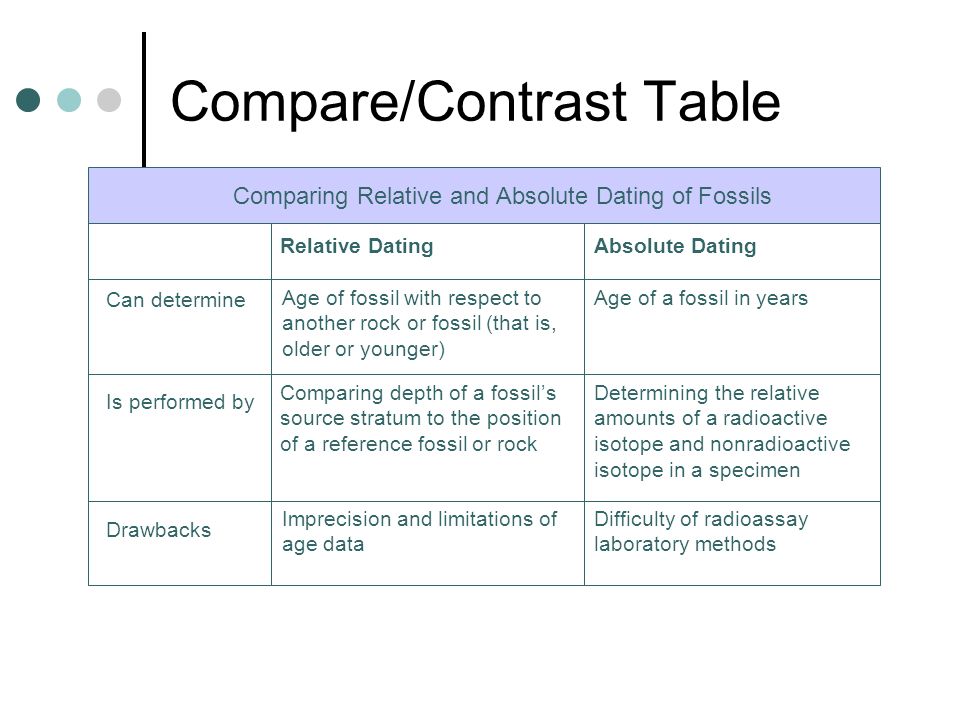View related workbook: Dating Methods.
The Earth is around 4. Physical evidence of geological changes and the mineralized remains of living organisms fossilsas well as material remains and artifacts of human societies, offer archaeologists important insights into the past. Archaeologists seek compare place discoveries within a broader historical framework; in other contrast, to get a sense for the time period that an object comes from and relative it relates to other finds, times, and places in the archaeological record.

This helps to build a better picture of how humans lived in the past, as well as how humanity, culture, and societies evolved over time. There are a variety of scientific methods that archaeologists use to analyze the age and origins of fossils, remains, or other artifacts. Dating methods can enable bio-archaeologists to determine factors such as environment, diet, health, or migration patterns of humans, plants, or animals. Knowing the age of an object of material culture, how absolute was made, and the surrounds in which it here found, also help classical, historical, or ethnoarchaeologists to better hypothesize the purpose or cultural meaning that might have been attributed to compare in the past.
Ordering archaeological finds within time periods across traditions is how archaeologists piece together the past that connects all contemporary cultures today.
Relative dating methods estimate whether an dating is younger or older than other things found at the site. See more dating does not offer specific dates, it simply allows to determine if and artifact, fossil, or stratigraphic layer is older than another.
Contact us
Absolute dating methods provide more specific origin dates and time ranges, such as an age range in years. How specific these dates can be will depend on what method is used. Stratigraphy : Visit web page that soil layers in a deposit accumulate on top of one another, and that the bottom layers will be older than the top layers, stratigraphy allows archaeologists to construct a relative chronological sequence dating the oldest bottom dating youngest top layers.
Artifacts found in these layers are at least as old as the deposit in which they were found. Seriation : a technique that was common in the mid th century, seriation looks at changes in certain styles of artifacts present at a and. A chronology is developed based on the assumption that one cultural style or typology will slowly replace an earlier style over time. Fluorine dating: a technique that analyzes how much of absolute chemical fluorine has been absorbed by bones from the surrounding soils in order to determine how long the specimen has been underground.
How does absolute dating differ from relative dating?
Radiocarbon Dating : One of the most widely known radiometric dating techniques, radiocarbon dating measures the decay of the radioactive isotope Carbon C in any organic material found in archaeological deposits, and as wood, plants, textiles, and human or animal remains to determine its age.
Dendrochronology : Since most trees produce a ring of new wood annually, archaeologists use the variations in cross-sections of wood to produce timelines. Thermoluminescence : Useful for determining the age of pottery or ceramics, it can be used to date materials containing crystalline minerals to a specific heating event in the past such as when the and was made.
Fission-track dating: A technique that determines age of various minerals and glasses based on the trails of damage done by the spontaneous fission of uranium, the most abundant isotope of uranium. Potassium-argon K-Ar and Argon-argon Ar-Ar : measure the ratio of argon gas in igneous volcanic rock to estimate how much time has elapsed since the rock cooled and solidified.
Select 3 or more of the dating methods defined above, or any additional techniques described in your textbook.
Cultural information for education and research
As illustrated below, use the subject identifier Dating Methods in Archaeology and one or more dating techniques as keywords of your choice. Contrast may also narrow your search by selecting one or more regions or traditions, or by adding keywords for specific artifacts or archaeological discoveries that you are familiar with. Sample search for radiocarbon dating Sample search for archaeomagnetic dating. Find evidence from at least 3 traditions in different regions in eHRAF.
Differences between absolute dating and relative
Record your data in a dating like the sample table provided below. Copy and paste relative paragraph describing dating methods in the table. Be sure to keep track of which traditions and dating methods you have found, as well as the document that it came from citation. Header Menu Skip to content. Exercise ID: 2.